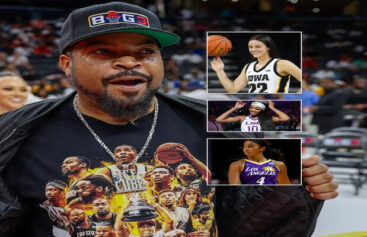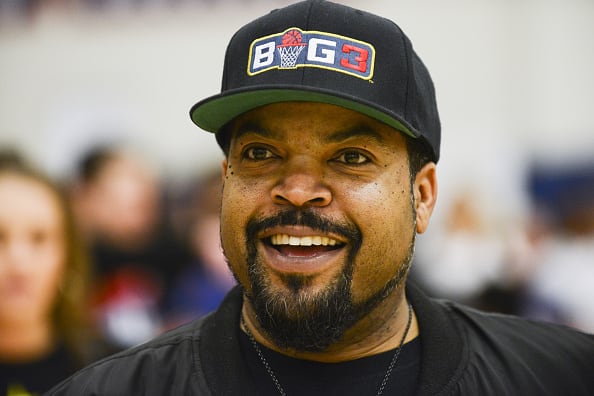The Dream Team looks to acquire the 22 Disney sports channels and create a network for the culture.
LL Cool J and Ice Cube are in the midst of a historic and unprecedented black corporate power play, one that will empower the Black narrative in sports and cultivate a new generation of storytellers and thought-influencers.
Late last year, the hip-hop legends and entertainment moguls announced their plans to team up to acquire nearly two dozen Disney regional sports channels and create a platform to present sports coverage through a cultural lens driven by young people of color.
“A new network for a new world that’s really about sports and culture, “ LL told nbcnews.com in an interview.
The Justice Department is forcing Disney to sell off 22 sports channels, including the YES Network because it determined that Disney company had too much control and power in the sports TV landscape.
Ice Cube and LL Cool J looking to bid on 22 sports TV Stations Disney was forced to sell following their $71 billion acquisition of 21st Century Fox. @CheddarBigNews pic.twitter.com/EXa4zG2ixn
— Vanessa Freeman (@VanessaFreeTV) November 9, 2018
Enter the greatest collabo in hip-hop history.
“Something that could usher in a new era and really bring the voice of the new generation to the forefront,” is how LL described the goals of this endeavor. “ The Gen Zs, the millennials, really give these kids a platform, a way to engage in sports in a really cool and fun and exciting way — having a full network, great baseball being played and surrounding those great sports with really culturally diverse programming that really looks like America and has the voice of where the world is going.”
The Shadow League first reported the hip-hop hunt for several TV stations back in 2018.
According to a Feb. 22 report from TMZ, the veteran entertainers received several billion dollar commitments from Alex and Ani jewelry founder Carolyn Rafaelian and Big3 league co-founder Jeff Kwatinnetz.
According to bloomberg.com, “Private equity firm Centerbridge Partners LP is considering backing … Ice Cube’s bid…according to people familiar with the matter. Serena Williams is also rumored to be an investor in a deal that’s expected to reach as low as $15 billion and as high as $25 billion. LL and Cube have deep pockets and are planning to bid on all 22 channels.
Take a tour of Carolyn Rafaelian's Rhode Island mansion, Belcourt pic.twitter.com/7PmH7mtxOE
— Forbes (@Forbes) May 24, 2017
They’re hoping to create a new national network aimed at a younger, more diverse audience than traditional sports channels. “Changing the game” would be an understatement if Cube and LL can pull this off. Even if they can get 10 sports channels, that would be a significant start to finally giving sports commentary the passion and true sound that’s missing in the mainstream.
“Sports are great but the way they’ve been presented hasn’t been as entertaining for me,” LL said. “The voice, the take and everything around it, doesn’t, I think, enhance sports as much as it could. It doesn’t enhance the NBA as much as it could.
People giving their honest opinion about things, what they feel, if they disagree, they disagree, if they agree, they agree, if they’re a fan, they’re a fan, if they’re not, they’re not. That’s the world we live in. We have to open up the floodgates and let that voice be heard. This new network will allow that voice to be heard.”
The African-American sports media personality can be seen scattered over various corporate-owned sports mediums. While significant advances have been made over the years with people of color getting jobs as sports radio and TV hosts, analysts, broadcasters and anchors, the overall narrative and the stations that hire these personalities are controlled by wealthy whites.
There have been many instances over the past few years in which the “black” narrative in sports has been suppressed by whitewashed media conglomerates who hire a white sports journalism force, working in conjunction with predominantly white coaches working under an all-white ownership conglomerate to discount and undermine the honest, factual and passionate views of the black athlete and journalist.
Look no further than Jemele Hill and Colin Kaepernick and how they were treated by the white-owned corporations that cut ties with them because they expressed the views of their people rather than toe the company line with status quo, political correctness.
The irony in all of this is that The Walt Disney Company owns 80 percent of ESPN, the same company that bought Hill out, rather than accept her new role as national political target and social activist.
If there were actually black-owned sports stations, Kaepernick and Hill would have numerous regional platforms to express their views and offset the negative images and one-sided commentary that occurs every day in mainstream sports coverage.
“My thing is if Jemele says something you don’t like, “LL said in reference to the journalist’s historic Twitter battle with Donald Trump. “Someone can be on there expressing a contrarian view, but don’t silence her. Let’s let all the voices be heard. Let’s not control the narrative. The narrative has to be authentic. Whoever that voice is, kids want to hear from them.”
The Future: An All-Inclusive Sports Media
The fact that the company would be willing to sell its sports stations off to Cube and LL when they might not even be the highest bidders implies an understanding by Disney and The Justice Department that issues concerning the intersection of politics, pop culture, and sports need a platform unto itself.
Young people of color need a community to vent, celebrate, exchange culture and diverse thoughts on sports. In the long run, it will help all the major American sports expand in reach and profitability.
“MLB is going to get a new audience,” LL told NBC. “They’re going to get a new generation of viewers. We want to work closely with MLB, work closely with the NBA and all of the leagues to hit the reset button to bring new people to the table. It’s been the same thing over and over again, and we believe the same way we reinvented music and hip hop in a lot of ways, we believe in reinventing where sports and culture intersect.”
BREAKING: Ice Cube and LL Cool J have secured a multi-billion dollar investment in their pursuit of securing 22 local sports television stations, currently being sold by Disney. Could this be the BIG3’s new home on television? (Via @TMZ) pic.twitter.com/eNSM33G93L
— Big3 N3ws (@Big3N3ws) February 23, 2019
This is true progress, but winning the bid would totally flip the game upside down and possibly even spell the end of companies such as ESPN, FOX sports and other saturated outlets with a financial and psychological stronghold on the market.
I foresee the athletes taking control of the narrative as well and having their own sports shows, where they can speak from a personal perspective, rather than the perspective of someone who has nothing in common with them.
In fact, player-moguls like LeBron James and Kevin Durant could share their socially-motivated film projects through Cube and LL’s media corporation instead of white-owned companies like HBO, Showtime and Netflix.
According to @Variety, LeBron James is going to be an executive producer for a Showtime docu-series called "Shut Up and Dribble"
Let's re-watch LeBron James at the opening of the public school he funded to help under-privileged kids.pic.twitter.com/Lkqy56Cvw7
— The Shadow League (@ShadowLeague) August 6, 2018
“I think it’s very important,” LL, one of the original seed investors for the Big3, added. “ Look, look, we’re not excluding anybody. But it’s not going to be a moat with a castle inside of it. Everyone should be heard. Women should be heard. African-Americans, male and female, all different genders, everybody should have a voice. You know what I’m saying? Diversity is the truth, and it’s what American really is. The network needs to represent the culture. There are many facts but only one truth. America is diverse and the network should reflect that.”
At the very least, let’s commend Cube and LL for the entrepreneurship, vision, and commitment to shifting the culture of a sports media landscape that’s seriously lacking diversity, representation, and soul. They are true examples of the impactful growth of hip-hop and how the genre has created an offspring of Black men and women who are changing the world.


